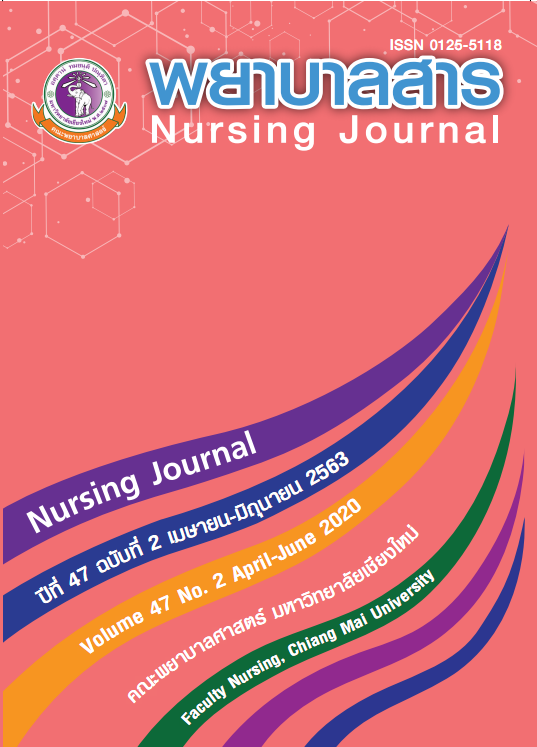Effects of Self-management Promoting Program on Health Behaviors and Blood Pressure Level of Persons with Uncontrolled Hypertension
Keywords:
Self-management Promoting Program, Health Behaviors and Blood Pressure Level, Persons with Uncontrolled HypertensionAbstract
Hypertension is a major public health problem in Thailand as well as all over the world because the number of persons who are unable control their blood pressure levels are constantly increasing which can lead to many complications. A self-management promoting program is important to help them to have better health behaviors and blood pressure levels.
This quasi-experimental research aimed to examine the effects of self-management program on health behaviors and blood pressure levels of persons with uncontrolled hypertension. The samples consisted of adults with uncontrolled hypertension who were on the list of treatment in the Chronic Disease Clinic, primary care unit of Saraphi, Chiang Mai. Forty-eight persons selected by criteria were assigned into experimental groups and control groups, twenty-four in each group. The data were collected during March to June 2017. The instruments used in this study consisted of the self-management promoting program in persons with uncontrolled hypertension, handbook of self-management in persons with uncontrolled hypertension, two videos about hypertension and how to self-manage for persons with uncontrolled hypertension, a book recording of self-management in persons with uncontrolled hypertension, manual blood pressure monitoring and the health behaviors for persons with uncontrolled hypertension questionnaire. The reliability of health behaviors questionnaire was .87, tested by Cronbach’s alpha coefficient. Data were analyzed by using descriptive statistics, independent t-test and paired t-test.
The results of this study revealed that the mean score of the health behaviors of persons with uncontrolled hypertension after receiving the self-management promotion program was statistically significantly higher than before and higher than the control group (p<.01). Systolic blood pressure and diastolic blood pressure of persons with uncontrolled hypertension after receiving the self-management promotion program was statistically significantly higher than before and higher than the control group (p<.05)
The findings of this study indicate the effectiveness of the self-management promotion program to promote and support persons with uncontrolled hypertension who must constantly monitor and adjust their health behavior which will lead to a better control of blood pressure levels.
References
Burns, N., & Groove, S. K. (2009). The practice of nursing research: appraisal, synthesis, and generation of evidence. St. Louis: Saunders Elsevier.
Chaichana, W., & Niyamas, H. (2007). Study of self-care behavior of hypertensive patients in a community in Chiang Rai province. Journal of Health Systems Research, 1 (2), 92-98. (In Thai)
Chompoo, S. (2008). Effects of self-management program on health behaviors and bloo d pressure of persons with hypertension (Master’s thesis, Burapha University). (In Thai)
Fang, J., Moore, L., Loustalot, F., Yang, Q., & Ayala, C. (2016). Reporting of adherence to healthy lifestyle behaviors among hypertensive adults in the 50 States and the district of Columbia, 2013. Journal of the American Society of Hypertension, 10 (3), 252–262.
Glanz, K., Rimer, B. K., & Viswanath, K. (2008). Health behaviour and health education. In C. T. Orleans (Ed.), Health education (4 th ed.). San Francisco: Jossey-Bass.
Glynn, L. G., Murphy, A. W., & Smith, S. M. (2010). What interventions improve the control of high blood pressure. Retrieved from http://www.cochrane.org/CD005182/HTN_what-interventions-improve-the-control-of-high-blood-pressure
Joint National Committee. (2003). The seventh report of the joint national committee on prevention, detection, evaluation, and treatment high blood pre ssure. Retrieved from http///www.nhbl.nih.gov/ guidelines/ hypertension/ Express.pdf
Kals, S. V., & Cobbs, S. (1966). Health behavior, illness behavior, and sick-role behavior. Archives of Environmental Health. An International Journal, 12 (4), 531-541.
Kanfer, F. H., & Gaelick-Buys, L. (1991). Self-management methods. In F. Kanfer & A. Goldtein (Eds.), Helping people change: A text book of methods. (4 th ed.). New York: Pergamonpress.
Khunthong, T. (2013). Impact of a self-managed supporting progr amme on self-management behaviour and sugar levels in category 2 insulin-dependent diab etes patients. Thai Journal of Nursing Council, 28 (1), 85-99. (In Thai)
Medical Research Network of the Consortium of Thai Medical Schools. (2014). Summary of evaluation of care for patients with diabetes and hypertension 2010-2015. Retrieved from https://dmht.thaimedresnet.org/document/NHSO_DMHT_2561_OnTour1_REGIONS_7_8.pdf (In Thai)
Noiparn, S. (2013). Effect of the self-management promoting program on food consumption behaviors in the elderly undergoing continuous ambulatory (Master’s thesis, Prince of Songkla University). (In Thai)
Phangjunan, T., & Phanthawet, N. (2015). Campaign issues for World Hypertension Day 2015.Retrieved from http://www.thaincd.com/media/leaflet/non-communi cable-disease.php. (In Thai)
Saelim, R. (2011). The effect of self-management enhancing program on health behav iors in patients with chronic peripheral arterial occlusion (Master’s thesis, Prince of Songkla University). (In Thai)
Seetisan, P., Suwannarat, A., & Jailungkar, J. (2013). Factors associated with self-care behaviors among uncontrolled hypertension patients in Dokkhamtai district , Phayao province. Lanna Pubic Health Journal, 9(2), 120-136. (In Thai)
Social Security Office, Maharaj Nakorn Chiang Mai Hospital. (2012). Hypertension. Retrieved from http://www.med.cmu.ac.th/hospital/sso/2555/health/129-hypertent ion.html (In Thai)
Sujamnong, S., Therawiwat, M., & Imamee, N. (2013). Factors related to self-management of hypertensive patients, Taladkwan District Health Promoting Hospital, Nontaburi Province. Journal of Boromarajonani College of Nursing, 29 (2), 20-30. (In Thai)
Thai Hypertension Society. (2015). Thai guidelines on the treatment of hypertension 2012 update 2015. Retrieved from http://www.thaihypertension.org/files/GL HT 2015.pdf (In Thai)
Thatsaeng, B., Lasuka, D., & Khampolsiri, T. (2012). Effects o f a self-management supporting program on self-management behaviors and blood pressure among elders with hyperten-sion. Nursing Journal, 39 (4), 125-137. (In Thai)
The Twelfth National Health Development Plan Steering Committee. (2017). The twelfth fiveyearnational health development plan (2017–2021). Retrieved from http://wops.moph.go.th/ops/oic/data/20161115144754_1_.pdf (In Thai)
Wankham, C., Wattana, C., & Khampalik, S. (2015). The effects of a self-management program on hypertension-controlling behaviors, and mean arterial pressure among persons with hypertension. Nursing Journal, 42 (1), 49-60. (In Thai)
Wongputtakham, S. (2008). Effects of self-management on health behaviors and blood pressureamong hypertensive patients. Nursing Journal, 36 (3), 125-136. (In Thai)
World Health Organization. (2011). Hypertension fact sheet. Retrieved from http://www.searo.who.int/entity/noncommunicable_diseases/media/non_communicable_diseases_hypertension_fs.pdf
Downloads
Published
How to Cite
Issue
Section
License
บทความที่ได้รับการตีพิมพ์เป็นลิขสิทธิ์ของวารสารพยาบาลสาร
ข้อความที่ปรากฏในบทความแต่ละเรื่องในวารสารวิชาการเล่มนี้เป็นความคิดเห็นส่วนตัวของผู้เขียนแต่ละท่านไม่เกี่ยวข้องกับมหาวิทยาลัยเชียงใหม่ และคณาจารย์ท่านอื่นๆในมหาวิทยาลัยฯ แต่อย่างใด ความรับผิดชอบองค์ประกอบทั้งหมดของบทความแต่ละเรื่องเป็นของผู้เขียนแต่ละท่าน หากมีความผิดพลาดใด ๆ ผู้เขียนแต่ละท่านจะรับผิดชอบบทความของตนเองแต่ผู้เดียว






